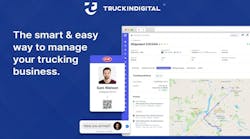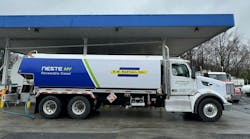Two of the nation's leading trucking industry trade groups-- American Trucking Associations (ATA) and the Truckload Carriers Association (TCA)--came together at the conclusion of ATA's 2011 Management Conference & Exhibition to call on policy makers to allow for increased truck productivity.
The ATA Board of Directors voted to add 88,000-pound, five-axle combinations with enhanced braking capability, to its list of preferred productivity improvements. This new component joins 97,000-pound, six-axle combinations and harmonization of longer-combination vehicles on the menu of productivity improvements ATA will advocate for in Washington DC and state capitals across the country. ATA endorsed increasing truck weight limits to 97,000 pounds in 2006. Also this week, TCA voted to approve a two-tiered productivity policy of supporting combinations of 88,000 pounds on five axles as well as 97,000 pounds on six axles.
“With possible hours-of-service changes threatening to limit capacity, congestion choking our highways and the driver shortage worsening, we need to find ways to improve our industry's productivity in order to continue delivering the nation's essential goods,” ATA Chairman Dan England, chairman C.R. England, said. “Studies have shown that more productive trucks are safer, more efficient and greener than conventional combinations without causing more wear and tear on our roads, and now that we and TCA have come together on this issue, we’re in a better position to continue to make that case to policymakers.”
“Given the advances in brake technology, an 88,000-pound, five-axle truck using enhanced brakes will meet federal rules limiting commercial vehicle stopping distance,” said TCA Chairman Gary Salisbury, president and chief executive officer of Fikes Truck Line, Hope AR. “By amending our policies and compromising, TCA and ATA have set the trucking industry on the road to success.” Polar Corp celebrating 65TH anniversary, history of innovation
From its start as a small welding shop in Opole MN, Polar Corp grew into North America’s largest manufacturer of aluminum, stainless steel, and carbon steel tank trailers. The tank builder celebrated its 65th anniversary on October 18.
The company started as the Opole Blacksmith Shop owned by brothers Vince, Roy, and Frank Warzecha, skilled welders who built high-quality stainless steel tanks for bulk milk distribution. Today, Polar employs more than 1,700 and is comprised of three companies: Polar Tank Trailer, Polar Service Centers, and Quality Trailer Products.
With three manufacturing plants, Polar Tank produces custom tank trailers for oil and fuel, food products, asphalt, chemicals, corrosives, and pneumatic bulk cargoes, as well as vacuum truck bodies. Polar Service Centers is the tank industry’s only factory-owned repair and parts network, with 28 locations in 17 states. Quality Trailer Products manufactures and sells parts and components for the light-duty trailer industry, including fenders, axles, brakes, and wheels.
“From custom engineering to comprehensive support throughout the life of the tank, Polar offers customers the expertise, innovation, and consistency they expect from an established industry leader,” said Ted Fick, Polar chief executive officer.
“As we celebrate this milestone, it’s a great time for Polar and our customers. We’re combining advanced technology and production techniques with a legacy of innovation, engineering, and customer support. At 65, we’re more nimble than ever.”
Polar continues to make capital improvements to modernize design, production, and Enterprise Resource Planning (ERP). Recent investments include 3D mechanical design and digital prototyping tools, precision manufacturing tools, and plant-footprint expansions. New ERP systems streamline the flow of information about costs, quality, product specification, and delivery among Polar Tank, Polar Service Centers, customers, and suppliers.








